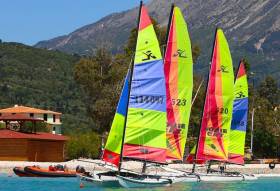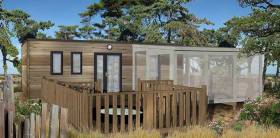Displaying items by tag: Sailing holiday
'Free' flights for Wildwind Sailing Holidays from Dublin
Good news for Irish sailors planning a Greek sailing holiday. Go-ahead UK firm Wildwind, based in Vassiliki and run by Simon Morgan, is now offering free supplemental flights to London and accommodation at the Hilton Hotel in Gatwick during the early weeks of the upcoming school holidays!
Unfortunately, there are no direct flights from Scotland or Ireland to the local airport in Greece, Preveza. The bulk of Wildwind's charter flights are with British Airways on Sundays leaving London Gatwick at 8 am (arriving in Greece at 1 pm) and returning at 4.35pm (you'll leave from Greece at 2 pm). This means that most of the clients travelling from Scotland and Ireland need to stay overnight in London in order to make the morning outbound flight. Usually, you will have a convenient onward connection on the return portion of your journey.
There are very good low-cost flights to Gatwick from a number of regional airports including Glasgow, Edinburgh, Belfast and Dublin. Wildwind recommends to stay the night in London and have a night on the town at the start of your holiday. They have even made a deal with the Hilton hotel near the airport to offer Wildwind guests discounted rates.
During the period of June 30th to July 20th, Wildwind will pay for both your flight and your hotel accommodation at the Hilton or another hotel of your choice, up to a maximum of £200 per adult and £150 per child, on the basis of reimbursement of expenses for regional travel and overnight accommodation.
More information by calling the Wildwind booking team at 01920 444 091 or emailing [email protected].
French Glamping & Sailing Holiday Hits The Spot in Noirmoutier
A luxury 'glamping' holiday in France with a choice of watersports right on your door step sounds like an ideal mix for a family watersports holiday in the big sailing region of the Vendee.
Original Camping and Alain Dominique Perrin attracted many foreign tourists last season on the island of Noirmoutier with their concept of glamorous camping, Glamping with plenty of waterports on tap including: Kitesurfing, Windsurfing, Sailing, Jetsking, Kayaking.
The only sport that you can’t practice on the island is surfing because the waves aren’t big enough.
Canvas and wooden accommodation facing the Atlantic ocean charms water sports enthusiasts as well as lovers of relaxation, beautiful landscapes and pampering.
The site also boasts a Teens and Children's Clubs with 'quadrilingual' staff that, the owners say, has won over parents and children of all ages.
The advertised price for four people for one week starts at €1,199






























































